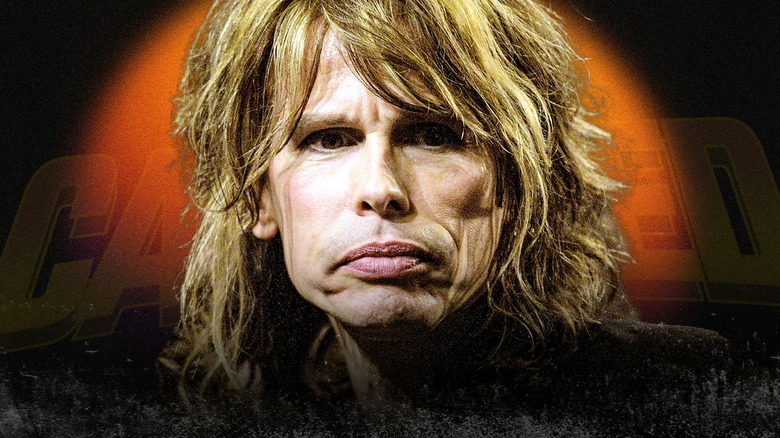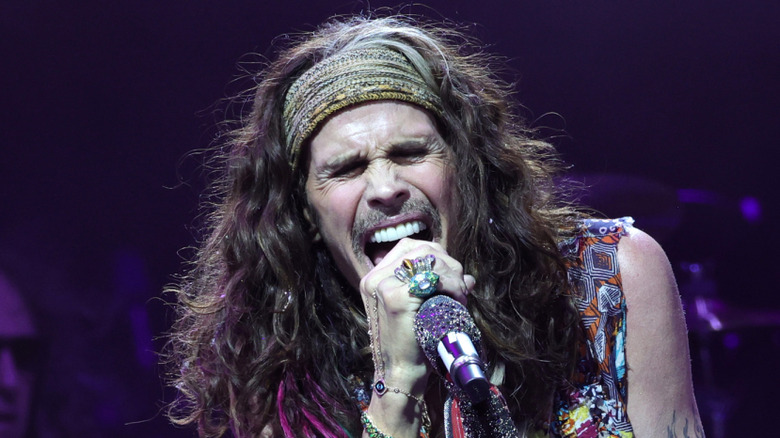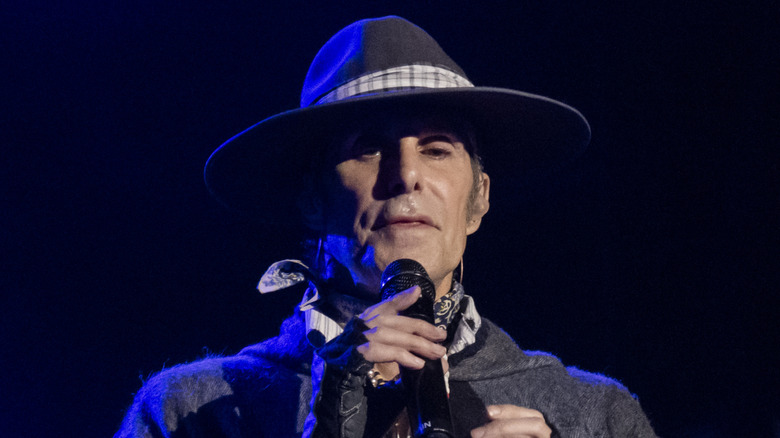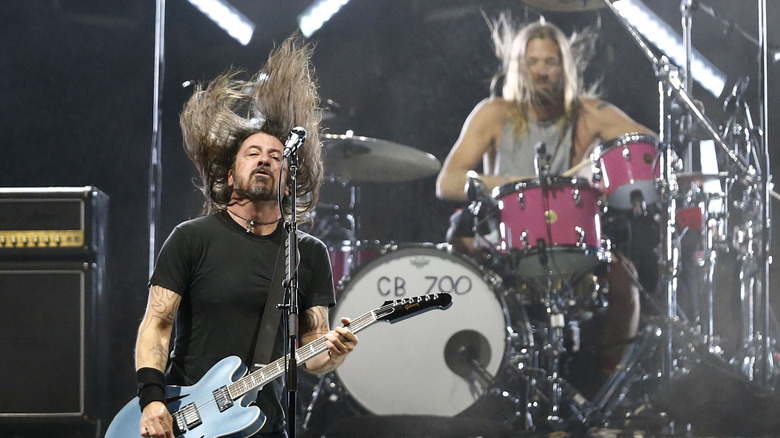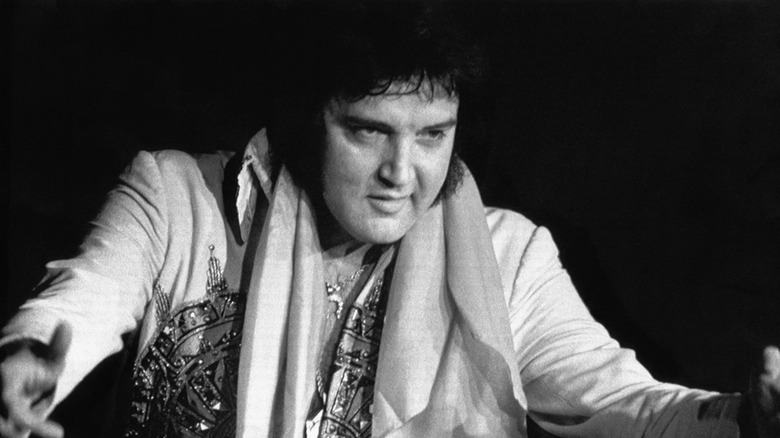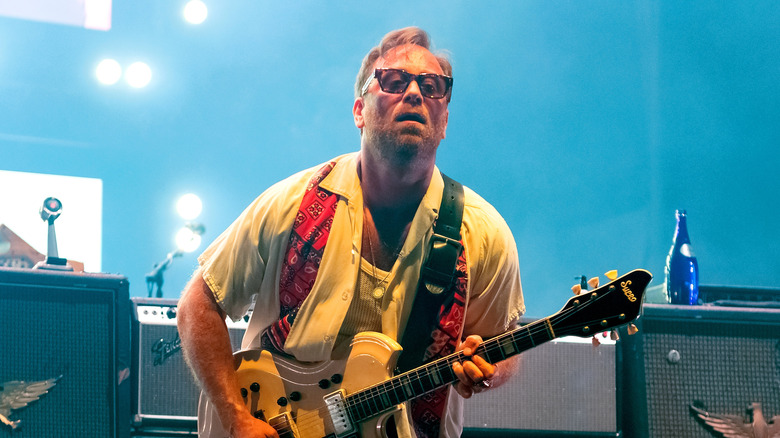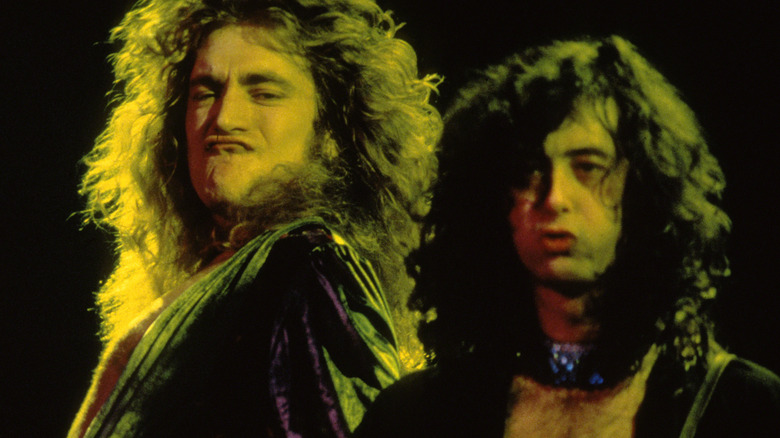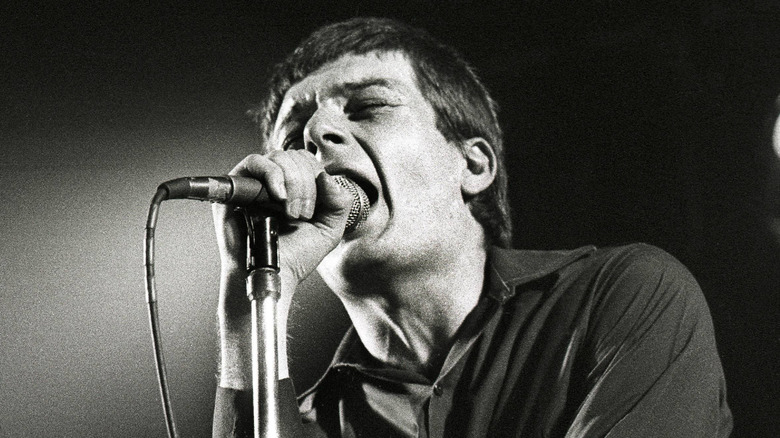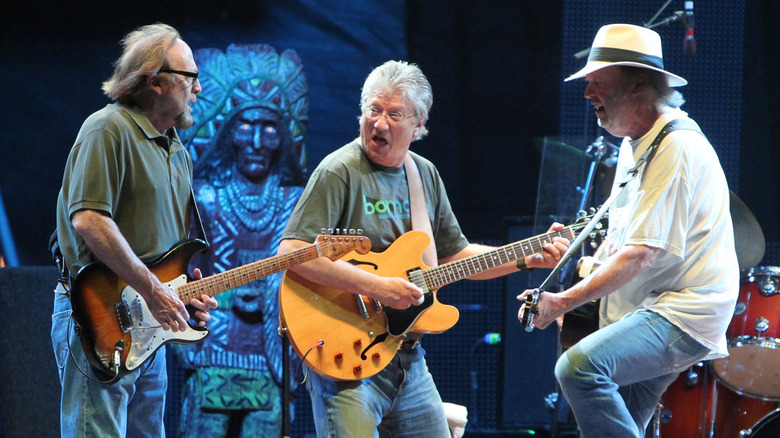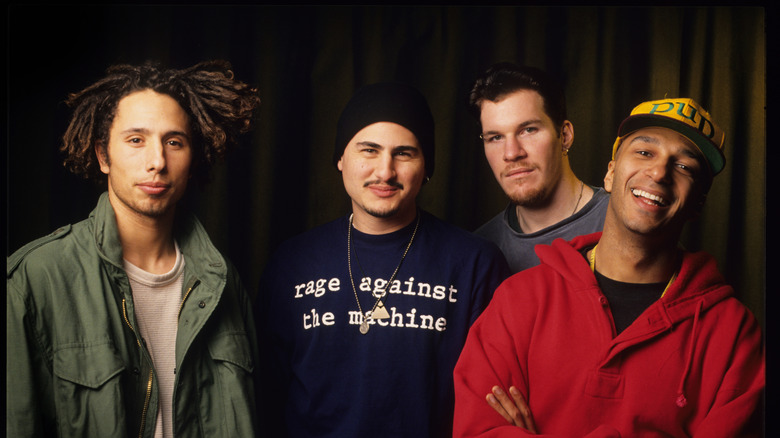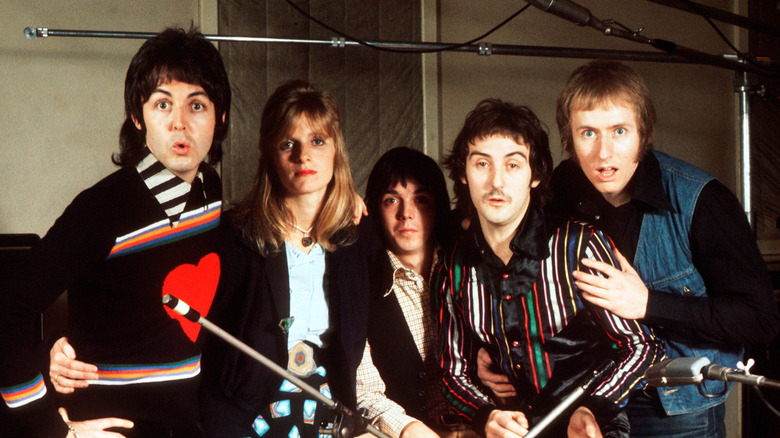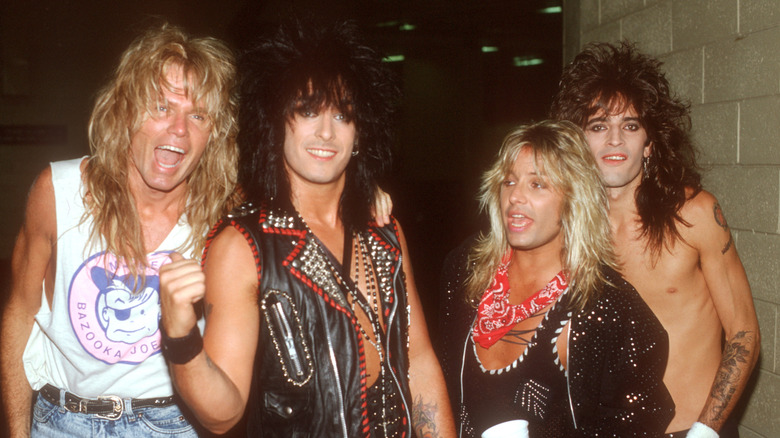Iconic Rock Star Tours That Got Canceled
While it might seem to be an objectively glorious or romantic notion, performing live music can be hard work, and heading out on a tour is part of the job description for successful performers. Rock stars of every level are expected to hit the road for several weeks of shows. Those concerts earn a lot of revenue, drive record sales and streaming numbers, and show fans that their favorite artists really care about them, all from doing what musicians purportedly love to do in the first place: perform their art in front of others.
Touring can also be a tremendous burden. What a massive undertaking it is to stage just one concert, with all of the necessary lights, sound equipment, and staff to organize, and then do all of that a few — or a few dozen — more times, traveling to a new city every night to do it. There are a lot of moving parts, and a lot can go wrong with a rock tour, up to and including the musicians themselves. Sometimes the behavior or circumstances of even the most reliable musicians can become untenable, and sudden problems require the cancelation or postponement of one concert or a whole group of shows. Here are some of the biggest and most important acts in rock history that canceled their anticipated and announced concert tours.
Aerosmith retired because its lead singer injured himself
Since its formation in Boston in the early 1970s, Aerosmith sold 150 million albums and released classic rock staples like "Dream On," "Sweet Emotion," "Janie's Got a Gun," and "Cryin,'" all built on the guitar of Joe Perry and the quirky stage presence of lead singer Steven Tyler. But after more than 50 years as an entity, Aerosmith announced that the end was near. In May 2023, the band shared details about its final concert tour, a collection of 40 shows across North America to take place starting in early September and conclude with some dates in January 2024.
Three concerts into the "Peace Out" tour, Aerosmith announced some necessary reschedulings. Tyler had been experiencing vocal issues, and after initially just postponing six dates, the singer received a more complete and dire diagnosis, leading Aerosmith to temporarily call off its entire remaining slate of shows. Tyler had damaged his vocal cords and also endured a fracture in his larynx. "I am heartbroken to not be out there with Aerosmith," Tyler said in a band statement on Facebook. "I promise we will be back as soon as we can!" The three dozen-plus concerts were never rescheduled. Tyler was still recovering from his substantial vocal injuries about a year later, in August 2024, leading Aerosmith to call off the tour and call it a day as a band.
Jane's Addiction broke up and quit touring after an onstage fight
Throughout its lengthy history, the members of Jane's Addiction have experienced a lot of internal tension that turned public. The group decided to split up after a grueling 13-month tour in support of 1990's "Ritual de lo Habitual" but only after headlining Lollapalooza in 1991. On the first night of that tour, singer Perry Farrell and guitarist Dave Navarro got into a fight, and the latter tossed his guitars into the crowd, ending the concert early.
The band reunited occasionally over the years, most recently mounting a 2024 tour. At the Boston stop, Farrell and Navarro engaged in another onstage physical altercation. Farrell, apparently angered by technical errors and sick with a sore throat and tinnitus which made singing difficult, shoved and screamed at Navarro as he played the song "Ocean Size." Navarro tried to keep his distance, but then Farrell tried to go in for a punch. Bassist Eric Avery stepped in to force Farrell away while Navarro walked off the stage. That exit ended the song, show, and tour — 15 scheduled concerts wouldn't happen. "Due to a continuing pattern of behavior and the mental health difficulties of our singer Perry Farrell, we have come to the conclusion that we have no choice but to discontinue the current US tour," three-quarters of Jane's Addiction said in a statement on Instagram.
Foo Fighters fell into disarray when its drummer died mid-tour
Foo Fighters were supposed to spend most of 2022 on tour, playing stadiums and festivals all over the world to celebrate its 27th anniversary as a band and its induction into the Rock and Roll Hall of Fame. The jaunt began in earnest with shows in Mexico, Argentina, Paraguay, and Brazil. On March 25, 2022, Foo Fighters was booked as a headliner for the Festival Estereo Picnic in Bogota, Colombia, and then an appearance on the Grammy Awards and a two-month respite.
On the day of the Bogota show, drummer Taylor Hawkins was found dead in his hotel room. "The Foo Fighters family is devastated by the tragic and untimely loss of our beloved Taylor Hawkins. His musical spirit and infectious laughter will live on with all of us forever," the band said in a statement on X, formerly known as Twitter. An initial toxicology report from the attorney general of Colombia's office cited 10 drugs in Hawkins' system at the time of his death, ranging from prescription antidepressants to opioids. Four days after the death of its 50-year-old drummer, Foo Fighters announced that it would immediately end its 2022 tour. The band remained on a hiatus until May 2023, when it regrouped with new drummer Josh Freese.
Elvis Presley died during a break in his 1977 tour
In what would be the final 12 months of Elvis Presley's life, the King of Rock 'n' Roll spent a lot of time on the road, performing in large theaters and arenas to throngs of fans eager to hear the bygone star of the '50s and '60s perform his now-old hits. He played shows throughout most of April, May, and June, and after a concert in Indianapolis on June 26, 1977, Presley headed home to Memphis for a break before embarking on another leg of his tour.
On the morning of August 16, 1977, Presley went to the master bedroom in his Graceland estate to get some sleep before a flight scheduled for that night. He was supposed to head to Portland, Maine, to play two nights of shows at the Cumberland County Civic Center, the first concerts in a small stint that would take him around the Northeast and the upper South until the end of August. Enduring bouts of insomnia and constipation, Presley left his bed around 9:30 a.m. and told fiancee Ginger Alden that he was heading into the bathroom. Alden found Presley dead in that room at about 2:30 p.m. Presley was 42 years old, and his death would keep his planned tour from taking place.
The Black Keys couldn't sell enough tickets
In the late 2000s and into the 2010s, the groovy, buzzy blues rock of the Black Keys was everywhere. Just two guys, Dan Auerbach and Patrick Carney, made a lot of noise, and while four straight albums earned gold or multi-platinum awards from the RIAA, their songs like "Lonely Boy," "Gold on the Ceiling," and "Fever" scaled the alternative rock chart and soundtracked dozens of commercials, movies, and TV shows.
As successful as they seemed, the Black Keys didn't engender a lot of demand as a live band. It unveiled in April 2024 its dates for the year: Following a span of shows in Western Europe, the duo would head back to the U.S. for its two-month "International Players" leg. It was booked to play professional basketball-size arenas in cities such as Dallas, Houston, and Los Angeles, but the whole thing was cancelled in late May due to extremely poor ticket sales. Technically, the Black Keys postponed the shows, claiming it would work to reschedule the dates in much smaller venues to provide an "exciting, intimate experience for both fans and the band" (via Stereogum). Days after the tour ended before it could begin, the Black Keys fired its management team.
A death in the band prevented Led Zeppelin from touring in 1980
Led Zeppelin was one of the biggest bands of the 1970s. Electric, blues-based heavy-metal guitar licks from Jimmy Page and the soaring vocals of frontman Robert Plant helped the band pack arenas year after year and release some of the best-selling albums of all time, including "Led Zeppelin IV" (which included the classic "Stairway to Heaven") and "Physical Graffiti." Following the release of the 1979 album "In Through the Out Door," Led Zeppelin planned to greet the '80s with the same passion it had executed in the 1970s. On September 11, 1980, the group's label, Swan Song, issued a press release listing the 19 tour dates it would play in the United States and Canada on its "The 1980s: Part One" tour.
Among the most tragic stories about Led Zeppelin: the 1980 death of drummer John Bonham, who died while asleep after a day of heavy drinking. His death occurred two weeks after Led Zeppelin revealed its tour dates and three weeks before the tour was set to get underway in Montreal. The surviving members of Led Zeppelin immediately canceled all engagements and, months later, broke up entirely.
Ian Curtis' death came just before Joy Division's first American tour
Forming in Manchester, England, in 1976, Joy Division defined the post-punk sound. Songs about pain, ennui, and disaffection, like "Transmission," "She's Lost Control," and "Love Will Tear Us Apart," were simply recorded and sounded sparse and haunting to young Britons, particularly when performed in a hypnotic near-drone by frontman Ian Curtis. With a tight live sound and Curtis' free-form dancing, Joy Division built up a presence and reputation in the U.K., tirelessly playing dozens of club shows between 1977 and 1980. By that point, the group had released two studio albums, and its popularity was such that a Joy Division tour of the U.S. was justified. The band's team had prepared an itinerary that would have the musicians leave England on May 19, 1980, and on May 21 play the first of three nights at Hurrahs, a venue in New York City, then hit clubs in Toronto, Chicago, Madison, Minneapolis, San Francisco, and Los Angeles, before boarding a flight back to England on June 10.
One May 18, 1980, one day before Joy Division was supposed to fly to the U.S., Curtis' body was found in his home. The singer, who'd long dealt with depression, died by suicide at the age of 23. The American tour didn't happen, and later that year, the surviving members of Joy Division formed a new band, the synth-pop outfit New Order.
Neil Young scuttled a Buffalo Springfield reunion
A one-hit wonder who deserved more than 15 minutes of fame, Buffalo Springfield hit it big in 1967 with the counterculture protest song "For What It's Worth." The band never scored another hit, and after its 1968 split, its members would go on to form huge bands like Poco and Crosby, Stills, Nash & Young. The musicians in Buffalo Springfield stayed busy creatively and professionally for more than 40 years. The band only reunited in 2010 to play the Bridge School Benefit, an annual event organized by Buffalo Springfield member Neil Young. He, along with Richie Furay and Stephen Stills, had such a good time together that they played a limited series of six small venue shows in California in the summer of 2011, capped with a spot at the Bonnaroo festival. At that point, Furay announced that a tour for later that year was in the works, which was then pushed to 2012, should Young be able to clear out his schedule. "There's not a timeline at this point. Buffalo Springfield is at the top of Neil's list of priorities," David Spero, Furay's manager, said to Rolling Stone. "It's just a matter of finding a time that works for everybody."
But around the same time that he reunited with Buffalo Springfield, Young also got back together with his longtime backing band, Crazy Horse. He quickly recorded two albums with that group, leaving the Buffalo Springfield tour permanently on hold.
A busted shoulder ruined a Beastie Boys and Rage Against the Machine tour
Two groups are largely responsible for the rise of rap-rock in the late 1990s: the often humorous, more rap-oriented Beastie Boys and the deadly serious, politically leftist guitar-based Rage Against the Machine. With both bands experiencing career highs by 2000, with the respective success of the albums "Hello Nasty" and "The Battle of Los Angeles," the Beastie Boys and Rage Against the Machine made plans to embark on a co-headlining tour, "Rhyme & Reason 2000."
Set to begin in August 2000, the first shows were delayed following a bicycle accident involving Mike D of the Beastie Boys — while riding in New York after a rehearsal, he ran into a pothole and dislocated his shoulder so severely that he needed surgery, physical therapy, and at least a month of recuperation. Attempts to reschedule postponed shows proved difficult due to scheduling issues with the bands and some of the arenas that had agreed to host them. In an entry in the tragic real-life story of Rage Against the Machine, the Beastie Boys' publicist announced the tour was off entirely in September 2020.
Wings couldn't take off when Paul McCartney got arrested
While generally overshadowed by leader Paul McCartney's previous band, the Beatles, as well as his later solo career, Wings was a major touring and recording act in the 1970s. Formed in 1971 by McCartney just months after the Beatles fell apart, the group more properly known as Paul McCartney and Wings made seven studio albums and notched Top 10 hits like "My Love," "Jet," "Band on the Run," and "Silly Love Songs." The band, which also included McCartney's wife, Linda, and former Moody Blues guitarist Denny Laine, toured often in the mid-1970s, and in January 1980 it attempted to take its show to Japan for a whirlwind set of 11 shows in 13 days.
When McCartney arrived in Tokyo on January 16, 1980, his bags were searched by authorities for contraband. They found something highly illegal: about 8 ounces of marijuana. McCartney was arrested and detained in a Tokyo jail. Because he'd be imprisoned for a little while at least, promoters had little choice but to call off all of the Japan gigs. McCartney was released after 10 days in custody, and Wings never played a show in Japan. The frontman also decided to not embark on a potential summer 1980 tour of U.S. venues, and in 1981, Wings was done forever after Laine departed.
Motley Crue had to cancel because of a drug overdose but let snow take the fall
Mötley Crüe is a band surrounded by controversy, much of that tied to prodigious partying and substance abuse during its 1980s heyday as one of the leading proponents of the glam metal movement. That all came to a breaking point on December 23, 1987, when, in one of the most tragic stories about Mötley Crüe, bassist Nikki Sixx overdosed on heroin. He woke up in an ambulance after paramedics injected him with two adrenaline shots. That literally brought the musician back to life after he'd technically been dead for two minutes. After a check-in at a hospital, Sixx was released, but the media picked up and spread inaccurate reports that he'd died from the overdose.
Sixx was in no shape to play concerts with his band, and so in January 1988, the U.K. office of Mötley Crüe's record label, Warner Bros., issued a press release announcing that a heavily publicized upcoming tour of the British Isles would not take place. Acting on executive decisions, the press agent blamed a blizzard in England leaving so much snow on the concert halls Mötley Crüe planned to play that roof collapses were a threat to the safety of the band and its fans. Immediately, members of the media contacted Warner Bros. and called foul, not falling for what was a ruse to cover up Sixx's widely reported health crisis.
If you or anyone you know needs help with addiction issues or is struggling or in crisis, contact the relevant resources below:
- Visit the Substance Abuse and Mental Health Services Administration website or contact SAMHSA's National Helpline at 1-800-662-HELP (4357).
- Call or text 988 or chat 988lifeline.org
